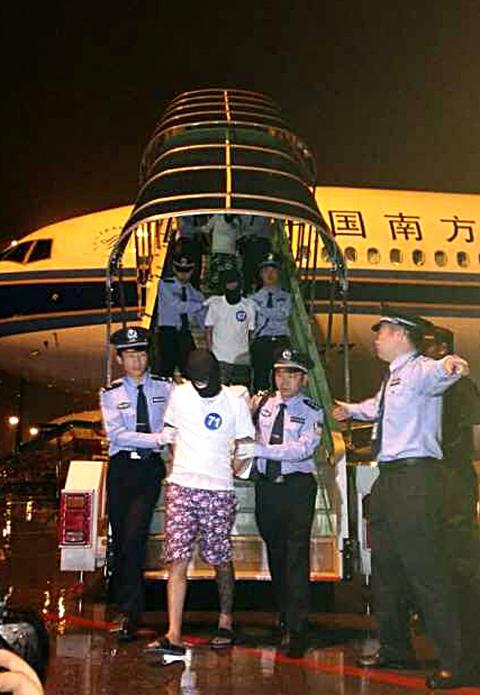Taiwan yesterday lodged a formal protest against Malaysia for deporting 32 Taiwanese fraud suspects to China.
Executive Yuan spokesman Sun Lih-chyun (孫立群) said the 32 people were taken to China earlier yesterday aboard a plane sent by Beijing.
Presidential Office spokesman Charles Chen (陳以信) said President Ma Ying-jeou (馬英九), hoping to ensure the rights of the 32 Taiwanese, directed Premier Simon Chang (張善政) to convene meetings with Cabinet members and send a delegation to collect evidence and clarify details of the case.

Photo: CNA
The Mainland Affairs Council and the Ministry of Justice have been directed to communicate with China in a timely fashion, Chen added.
The 32 people deported to China yesterday were among a group of 52 Taiwanese who were arrested in Malaysia last month on suspicion of telecommunications fraud targeting people in China.
Twenty other Taiwanese suspects were sent back to Taiwan on April 15 at Taipei’s request.
However, controversy erupted as the 20 were released shortly after returning to Taiwan.
Authorities said the group were allowed to go free due to a lack of evidence that they had engaged in illegal activities overseas.
On Thursday last week, 18 of the 20 were detained after prosecutors won a case saying that there was strong evidence against the group.
A Ministry of Foreign Affairs official said the release of the 20 suspects upon their arrival in Taiwan has been cited by China as evidence of Taiwan’s “light treatment of fraud suspects” in its argument used to pressure Kuala Lumpur to deport the remaining 32 to China.
The ministry said it has lodged a protest with Malaysia over the matter, saying: “The move has severely harmed amicable ties.”
Democratic Progressive Party spokesperson Wang Ming-sheng (王閔生) yesterday condemned the move, saying it was a breach of Taiwan’s jurisdiction over its people.
Yesterday’s case followed a similar incident earlier last month when a group of Taiwanese, acquitted by a Kenyan court of operating telecoms equipment without a license, were forced to board an airplane bound for China.
The Ministry of Justice yesterday said it contacted China’s Ministry of Public Security as soon as it learned Friday that Malaysia was planning to send the 32 Taiwanese to China.
The ministry pointed out that during their last negotiations in Beijing April 21, the two sides reached several understandings, including jointly investigating the telecommunications fraud cases uncovered in Kenya and Malaysia.
It added it is currently discussing with China the possibility of sending a second delegation to Beijing to negotiate over the case.

NATIONAL SECURITY THREAT: An official said that Guan Guan’s comments had gone beyond the threshold of free speech, as she advocated for the destruction of the ROC China-born media influencer Guan Guan’s (關關) residency permit has been revoked for repeatedly posting pro-China content that threatens national security, the National Immigration Agency said yesterday. Guan Guan has said many controversial things in her videos posted to Douyin (抖音), including “the red flag will soon be painted all over Taiwan” and “Taiwan is an inseparable part of China,” while expressing hope for expedited “reunification.” The agency received multiple reports alleging that Guan Guan had advocated for armed reunification last year. After investigating, the agency last month issued a notice requiring her to appear and account for her actions. Guan Guan appeared as required,

A strong cold air mass is expected to arrive tonight, bringing a change in weather and a drop in temperature, the Central Weather Administration (CWA) said. The coldest time would be early on Thursday morning, with temperatures in some areas dipping as low as 8°C, it said. Daytime highs yesterday were 22°C to 24°C in northern and eastern Taiwan, and about 25°C to 28°C in the central and southern regions, it said. However, nighttime lows would dip to about 15°C to 16°C in central and northern Taiwan as well as the northeast, and 17°C to 19°C elsewhere, it said. Tropical Storm Nokaen, currently

‘NATO-PLUS’: ‘Our strategic partners in the Indo-Pacific are facing increasing aggression by the Chinese Communist Party,’ US Representative Rob Wittman said The US House of Representatives on Monday released its version of the Consolidated Appropriations Act, which includes US$1.15 billion to support security cooperation with Taiwan. The omnibus act, covering US$1.2 trillion of spending, allocates US$1 billion for the Taiwan Security Cooperation Initiative, as well as US$150 million for the replacement of defense articles and reimbursement of defense services provided to Taiwan. The fund allocations were based on the US National Defense Authorization Act for fiscal 2026 that was passed by the US Congress last month and authorized up to US$1 billion to the US Defense Security Cooperation Agency in support of the

PAPERS, PLEASE: The gang exploited the high value of the passports, selling them at inflated prices to Chinese buyers, who would treat them as ‘invisibility cloaks’ The Yilan District Court has handed four members of a syndicate prison terms ranging from one year and two months to two years and two months for their involvement in a scheme to purchase Taiwanese passports and resell them abroad at a massive markup. A Chinese human smuggling syndicate purchased Taiwanese passports through local criminal networks, exploiting the passports’ visa-free travel privileges to turn a profit of more than 20 times the original price, the court said. Such criminal organizations enable people to impersonate Taiwanese when entering and exiting Taiwan and other countries, undermining social order and the credibility of the nation’s